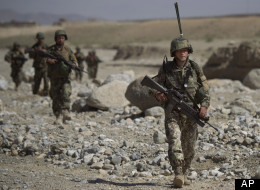By Joshua Hersh
Close ties between Afghan Taliban or criminal elements and officials highly placed in the government threaten to prevent the Afghan National Army from fulfilling its security responsibilities when it fully takes over control of the country, a top Afghan general told The Huffington Post.
Major General Afzal Aman, the chief of staff for operations at the Ministry of Defense, said in an interview on Thursday that Afghan security forces are sometimes forced to halt missions when the target turns out to have influential contacts in the Afghan government.
"A person who we know is guilty, if he has a relationship with somebody with high rank or authority in the government, or if he is close to a very rich person, there are some restrictions on what we can do," Gen. Aman said.
"Maybe you know about the influence of these dangerous people in the villages," he added. "In some cases we are finding that with some people we face, although we know they are lying, we know they are guilty, but we can't do anything about it."
Gen. Aman did not offer any specific examples, but he added that American and other Western forces "don't have these limitations."
Corruption -- within the government in general and the military specifically -- has long been identified as a major impediment to the security of the Afghan state.

The Huffington Post, May 18, 2012: Major General Afzal Aman, the chief of staff for operations at the Ministry of Defense, said in an interview on Thursday that Afghan security forces are sometimes forced to halt missions when the target turns out to have influential contacts in the Afghan government. "A person who we know is guilty, if he has a relationship with somebody with high rank or authority in the government, or if he is close to a very rich person, there are some restrictions on what we can do," Gen. Aman said. (Photo: AP)
A 2010 report by the Pentagon's Special Inspector General for Afghanistan Reconstruction found that corruption within the ranks of the Afghan military was "a key factor undermining developmental progress and morale at the unit level" -- something that coalition military officials readily acknowledge.
The International Security Assistance Force (ISAF) "considers corruption a considerable threat, and counter corruption is one of our campaign lines of effort," said Australian Brigadier Roger Noble, the deputy chief of staff for operations at ISAF in Kabul.
Noble said that ISAF has worked with the Afghan National Security Forces (ANSF) to improve its countercorruption monitoring and prevention and added that a new internal countercorruption task force at the Ministry of Defense had already "detected and punished offenders."
"We see the ANSF increasingly holding leaders to account, and the expectations of many Afghan soldiers and officers are high -- as they should be," Noble said. "If the force is professionalized, systematic, confident and values-driven, it will continue to gain ground in the fight against corruption. It is not an easy battle with Afghanistan's recent history and trials always close by in the rear view mirror."
But most of the attention on corruption within the Afghan military has focused on more mundane illegal acts: bribery, pilfering of supplies and pay fraud.
By contrast, Gen. Aman's remarks hinted at a potentially far more enduring obstacle that widespread influence peddling and corruption might pose to basic military operations.
It's also rare to hear these concerns expressed so bluntly by a high-ranking member of the Afghan military itself.
Gen. Aman's warning comes at a time when Afghan forces are increasingly finding themselves taking responsibility for military operations across the country.
Earlier this week, American forces handed over security responsibilities of a third tranche of territory to the Afghan government, putting the Afghan military in nominal control of at least one district in every province.
The Afghan Army has also been plagued by an apparent rise in so-called green-on-blue killings, in which a uniformed Afghan soldier kills a coalition service member. So far this year, 22 coalition service members have been killed by people in Afghan military uniforms, compared with 35 in all of 2011, according to The New York Times.
For the time being, most operations conducted by the Afghan military still include some participation and monitoring by Western advisers and mentors, and ISAF has so far only certified a small number of Afghan units as fit to operate fully independently.
In his interview with HuffPost, Gen. Aman expressed confidence that the problem of influence peddlers could be overcome with time.
"It's not particularly frustrating for me," he said. "We're going to solve it, bit by bit."



